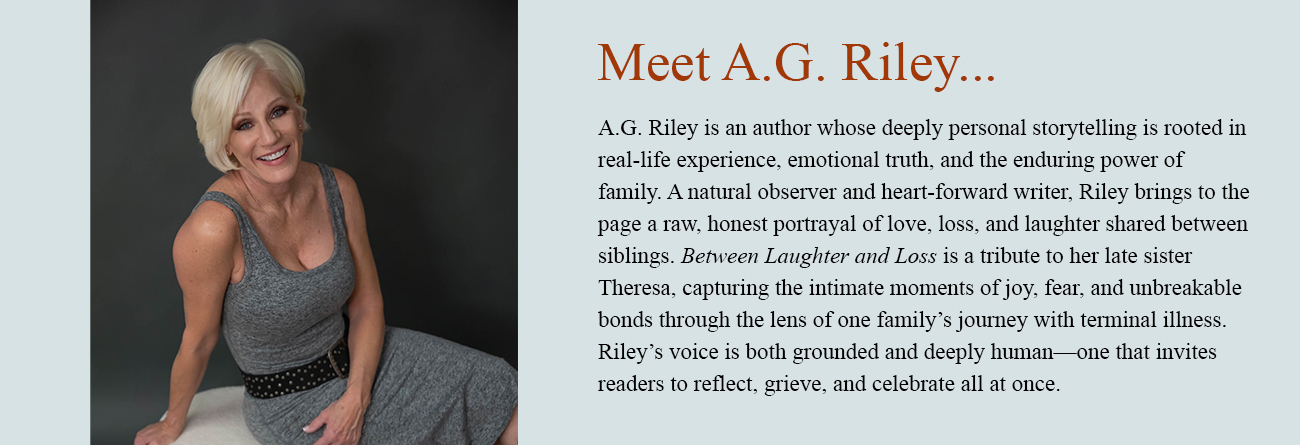Frequently Asked Questions (FAQ)
What inspired you to write this memoir?
This memoir was born out of love for my sister, Theresa. Walking alongside her during her final year taught me more about strength, humor, and unconditional love than I ever imagined. Writing became my way to hold on to those moments—the laughter in between the pain, the quiet talks late at night, and the lessons she left behind. I wanted to capture her spirit, not just her illness, so that her children, our family, and anyone who reads this book could feel the same resilience and joy she carried, even in the hardest days. It’s both a tribute to her and a reminder that even in loss, life can still be full of light.
How did you balance being a caregiver with everyday life?
Honestly, I didn’t. Every day, life sort of stopped for me because Theresa became my whole focus. Looking back, I wouldn’t change it for anything. Bills, errands, and routines all faded into the background, but the time I had with her is something I’ll never get back—and it mattered more than anything else.
What was Theresa like before her diagnosis?
Theresa was a force. She was bold, quick-witted, and always the one keeping everyone else in line. She loved her work, her family, and she had this spark that filled any room she walked into. She didn’t let people get away with much, but she did it with humor and love.
How did she want to be remembered?
She wanted to be remembered as someone who lived on her own terms—strong, funny, and deeply devoted to her son and daughter. She didn’t want pity or sadness. She wanted her life celebrated, with laughter and stories that made people smile.
Did writing the book help you with your own grief?
Yes. Writing gave me a way to process the heaviness while still holding onto the joy. It allowed me to relive the moments when Theresa was still laughing, still herself, and it reminded me that grief doesn’t erase love or memories.
What do you hope readers take away from Between Laughter and Loss?
I hope they understand that even in the darkest times, there can be light. That laughter and love can carry you through pain, and that saying goodbye doesn’t have to mean losing the person entirely.
Why was laughter so important in Theresa’s journey?
Because laughter was her way of taking back control. Cancer stole a lot from her, but it never stole her sense of humor. Laughter gave her strength, and it gave the rest of us permission to breathe, even in the middle of heartbreak.
How did your family respond to the book?
It’s emotional for them, of course, but they’re grateful. They see it as a way for Theresa’s voice to live on. Some moments are hard to read, but there’s comfort in knowing her story is out there, touching others.
Were there parts of the story that were especially difficult to write?
The hospital scenes were the hardest. Reliving the pain, the fear, and watching her body weaken—that was tough. But those moments were part of the truth, and I wanted to honor her whole journey, not just the easy parts.
What was the most surprising thing you learned about yourself while caring for Theresa?
I learned how strong I really was. I always thought of Theresa as the strong one, but caregiving showed me that I had that strength in me, too. I could be steady when she needed it most.
What role did faith or spirituality play in Theresa’s final year?
Theresa’s faith gave her peace. She didn’t see prayer as a way to change her outcome, but as a way to accept it with strength. For me, it was less about organized faith and more about feeling that something bigger than us was holding us up when we couldn’t hold ourselves.
How did Theresa’s son and daughter handle her illness, and how are they doing now?
It was incredibly hard on them. They were young adults, forced to face something no one ever wants to. They struggled in their own ways, but they loved their mom fiercely. Today, they carry her with them—in the choices they make, in their humor, and in the love they share with others.
How do you think your bond as sisters shaped the story?
It shaped everything. Theresa and I had a lifetime of memories, inside jokes, and trust between us. That closeness gave me the ability to walk with her through the hardest part of her life, and it gave her the freedom to be fully herself around me, even at her weakest.
What advice would you give to families caring for a loved one with a terminal illness?
Don’t get so caught up in the illness that you forget the person. Make room for laughter, for small joys, for living in the moment. And don’t wait to say what needs to be said. Time has a way of slipping faster than you think.
What’s next for you as a writer? Will there be more books?
Yes—I’ve found my voice through this experience, and I want to keep writing. Whether it’s more memoirs, essays, or even fiction, I know Theresa would want me to keep sharing stories that remind people of the beauty in life, even when it’s messy or painful.

